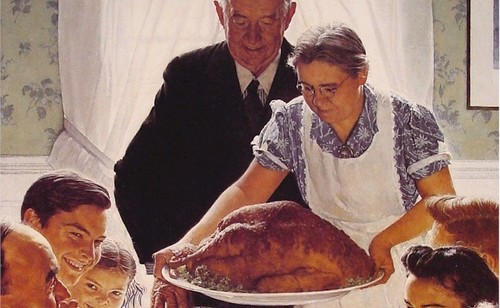I love Thanksgiving. I love Thanksgiving, and it’s not only because it’s a day where gluttonous servings of pumpkin pie and marshmallow-covered sweet potatoes are considered an obligatory indulgence. I love Thanksgiving, in part, because it’s a holiday founded in my own Calvinist tradition.
Brought to us in a period that I’ve often called the Golden Era of American Christianity and brought to us by a people who I feel to be have been the finest Christians ever to stand upon our shore – the Puritans – Thanksgiving can’t be divorced from the religion that understood God’s Providence and sovereign blessings.
The first holiday known as a “Thanksgiving to God” was declared in 1623. The pilgrims were Calvinist Protestants, intent on rejecting the institutionalized Church of England. The Plymoth Plantation website records…
The American Thanksgiving also has its origin in the faith practices of Puritan New England, where strict Calvinist doctrine sanctioned only the Sabbath, fast days and thanksgivings as religious holidays or “holy days.” To the Puritans, a true “thanksgiving” was a day of prayer and pious humiliation, thanking God for His special Providence. Auspicious events, such as the sudden ending of war, drought or pestilence, might inspire a thanksgiving proclamation. It was like having an extra Sabbath during the week. Fasts and thanksgivings never fell on a Sunday. In the early 1600s, they were not annual events…
So if you’ve ever wondered why Thanksgiving falls on a Thursday and not Sunday, it’s because of the Covenantal theology of the Puritans that highly value the New Testament Sabbath or Lord’s Day (Sunday). Regardless of all the details, however, one thing is for sure – the deeply religious founders of this holiday viewed it to be primarily not about gravy boats and football games, but about actually thanking God for his generous benevolence.
Key to understanding the Puritan’s desire for Thanksgiving is grasping their (and by extension, my) understanding of divine Providence. Theologically speaking, divine providence is God’s interaction or intervention in the world. The Pilgrims, Puritans, early Christians in the New World (that were by a great majority students of John Calvin) all believed that Providence described God’s detailed interaction with the world and his intimate control of all things. This concept – that God was intricately involved in the founding of the New World, the crossing of the ocean, the founding of the colonies, and so forth – eventually led to the concept of American Exceptionalism and the doctrine of “Manifest Destiny” that led our early American forbears to spread across the Continent and become the greatest nation in the world.
Because they had survived their tumultuous time in the New World, they gave credit to God’s Providence. Because they maintained tenable relations with the Native Americans, they gave credit to God’s Providence. Because their corn grew, they gave credit to God’s Providence. So then, Thanksgiving wasn’t a holiday to be randomly thankful for an assortment of lucky happenings and chance occurrences, but Thanksgiving was to give God credit for each and every single blessing, which the Calvinists saw as directly stemming from the will of God.
I don’t know about you, but I hold this belief near to my heart and can readily admit that each and every perfect gift in my life has been given by the will of God and dispensed through his providential care. I would suggest we all contemplate this Calvinistic, Providential view of creation that led to this holiday we know as “Thanksgiving.”
[Contributed by JD Hal]











